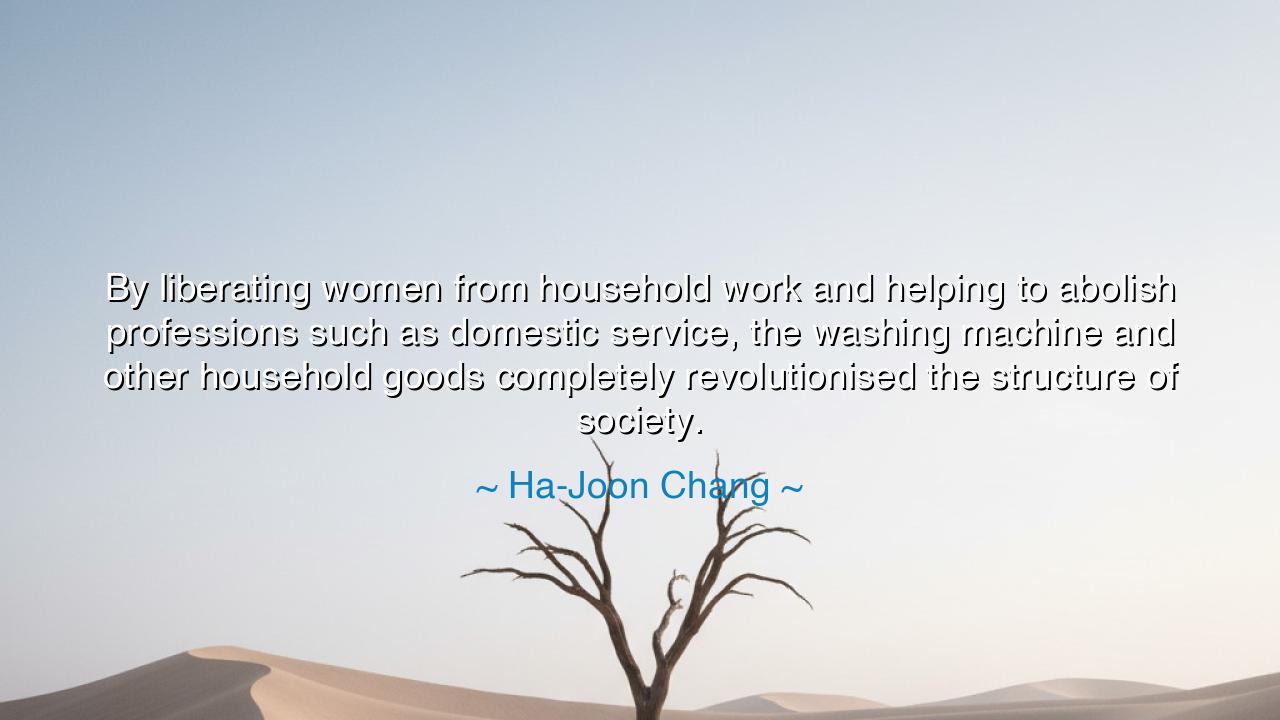
By liberating women from household work and helping to abolish
By liberating women from household work and helping to abolish professions such as domestic service, the washing machine and other household goods completely revolutionised the structure of society.






The words of Ha-Joon Chang—“By liberating women from household work and helping to abolish professions such as domestic service, the washing machine and other household goods completely revolutionised the structure of society.”—reveal a truth both profound and often overlooked. The engines of history are not only the swords of kings or the proclamations of governments, but also the humble inventions that change the rhythms of daily life. The washing machine, that unassuming servant of the home, carried within it a quiet revolution: it gave women, long bound by endless cycles of domestic labor, the gift of time, the freedom to dream, and the strength to step beyond the walls of the household.
In the ancient style of wisdom, this teaching shows us that freedom does not always arrive with fanfare, but sometimes with the turning of a wheel or the hum of a motor. For centuries, women bore the weight of domestic toil—washing clothes by hand, scrubbing, cooking, cleaning—labor so vast it consumed whole days and lives. With the coming of the machine age, the burden was lifted, not completely, but enough to change destinies. Chang proclaims that with this liberation, society itself was restructured. Women, freed from the tyranny of endless housework, could seek education, professions, and public life. A shift of power occurred, not upon the battlefield, but within the hearth.
History gives us vivid examples. In the 20th century, as the washing machine spread across Europe and America, women began to leave domestic service in droves. No longer did middle-class families depend upon armies of maids and laundresses, for the machine replaced drudgery. This collapse of servitude did not merely free the servant; it transformed entire economies. Women entered the workforce, became clerks, teachers, doctors, and leaders. Their hands, once worn raw by scrubbing, now held pens, stethoscopes, and tools of creation. The revolution was not only mechanical—it was spiritual and social.
Consider the story of Margaret Thatcher, who rose to become Prime Minister of Britain. She grew up as the daughter of a grocer, in a time when household labor consumed much of women’s energy. Yet by the mid-20th century, the spread of domestic appliances allowed women like her to pursue higher education and careers. Though her politics remain contested, her very rise was made possible by a society transformed—one in which women were no longer chained to domestic labor. In this way, the washing machine can be seen as a hidden architect of female leadership and participation in the modern world.
The meaning of Chang’s words stretches even further: he teaches that the tools we build shape the lives we live. It is not enough to speak of freedom; it must be supported by structures that make freedom possible. Without time, without relief from ceaseless toil, there is no opportunity to grow. Thus, the household machine is not merely a convenience, but a foundation of social progress, a silent partner in the movement toward equality.
The lesson for us, then, is to honor the small inventions and the overlooked tools, for they may shape society more deeply than we imagine. Do not despise the humble washing machine or the household device, for in them lies the liberation of countless lives. And in our age, let us look to the new tools of technology—communications, artificial intelligence, renewable energy—and ask: how might they liberate humanity further? How might they restructure society not for the few, but for all?
Practically, this means we must guard against using technology only to enrich or entertain. We must ask how it serves freedom, how it uplifts the marginalized, how it grants time and dignity to those burdened by labor. Just as the washing machine freed women for education and leadership, so must today’s inventions free humanity for wisdom, creativity, and justice. Each of us can play a part in ensuring that our tools are wielded not as chains but as keys.
Thus, the voice of Ha-Joon Chang reminds us of a hidden revolution: “The washing machine and other household goods completely revolutionised the structure of society.” Let us take this to heart, and see the profound in the ordinary. For the hum of a machine may carry the echo of freedom, the opening of doors once shut, and the promise of a society remade—not by force of arms, but by the quiet liberation of daily life.






AAdministratorAdministrator
Welcome, honored guests. Please leave a comment, we will respond soon